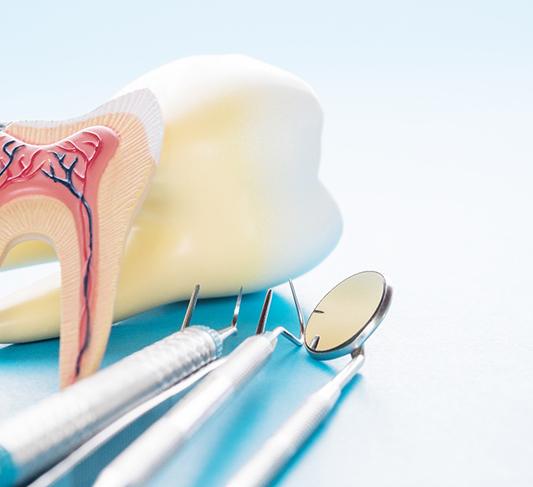Root Canal Treatment – North Raleigh, NC
Preserve Your Teeth, Stop Your Pain
Are you experiencing pain whenever you bite or chew your food? Have you noticed a pimple on your gums? Do your teeth suffer from lingering sensitivity whenever they come into contact with something hot or cold? These symptoms could all mean that your tooth is suffering from an infection, and in all likelihood the only way to stop the pain and prevent further damage is with root canal treatment. Get in touch with Dr. Lisk right away if you are experiencing any abnormal dental symptoms so he can restore the look, health, and function of your smile.
Why Choose Dr. Philip A. Lisk for Root Canal Treatment?
- Beautiful, Durable Crowns Offered
- Experienced, Meticulous Dentist
- Friendly Team, Welcoming Office
Do I Need Root Canal Treatment?

We mentioned a few warning signs previously, like pain when biting down. However, it’s important to remember that discomfort, soreness, and irritation aren’t the only symptoms that you need to look out for. To start, bleeding gums or a pimple-like bump on your gums could be the result of a severely decayed tooth. That’s why it’s important to get in touch with our North Raleigh emergency dentist the moment you notice that something is off. This will ensure that he can conduct an exam and determine if further action is needed while saving your tooth is still feasible.
The Root Canal Process

Although the procedure is complex, the step-by-step process is relatively simple. First, Dr. Lisk will numb the area of your mouth that he will be working on so you don’t feel any discomfort during your root canal. Once you’re comfortable and ready to begin, he will create a tiny hole in your tooth to access the pulp. Next, he will remove the damaged tissue and infected particles, sanitize the area to eliminate any lingering bacteria, and fill the tooth with a rubbery substance. Finally, he will place a temporary dental crown over your tooth until your final one arrives from the dental lab.
The Benefits of Getting a Root Canal

Despite what you may have heard, root canal treatment is virtually painless. In other words, the only thing you’ll feel is some slight pressure from Dr. Lisk working to restore your tooth. Of course, there are other noteworthy benefits as well, including the fact that this restorative procedure can save your tooth, preventing it from needing to be extracted. Plus, the success rate is incredibly high, and the restorations used are extremely lifelike!
Pulp Therapy

Anyone can suffer from pulp damage – even children. If your little one is suffering from constant unexplained oral pain, or if they have a permanent tooth that is unexpectedly loose, they could need treatment for inflamed or injured pulp. During pulp therapy, we might remove all of the pulp and pack the area with a biocompatible material, or we might be able to isolate just the affected parts of the tissue, leaving the rest intact.
Root Canal FAQs
How Long Does It Take to Recover from a Root Canal?
While recovery time will vary from person to person, most patients are able to return to work or school the day after their root canal. If your job requires physical labor, be sure to take the next two to three days off, as vigorous exercise can slow the healing process by diverting blood from the affected area.
You can expect your mouth to be sore for the next few days; for relief, take any prescribed or OTC pain relievers as directed.
Be sure to eat only soft foods and chew on the opposite side of the mouth as the treated tooth.
You may brush and floss your teeth as usual but be very gentle when brushing around the treated tooth. Should you experience worsening pain or if it does not decrease after the three-day mark, call Dr. Lisk as soon as possible.
How Much Pain is Normal After a Root Canal?
While your root canal procedure should not hurt, it is normal to experience some discomfort and soreness over the next few days. Once the numbness wears off, you may experience mild pain and sensitivity, however this is temporary and can usually be alleviated with OTC pain relievers such as acetaminophen or ibuprofen.
Avoid eating anything hard or crunchy during the recovery period as this can make pain worse. Pain should begin to dissipate after around the third day post-procedure, but if it doesn’t, please call Dr. Lisk right away.
How Long Do Root Canals Last?
Today’s root canals have an extremely high success rate. In fact, most teeth that have undergone this procedure go on to provide full chewing functionality for many years or even a lifetime.
The longevity of your root canal depends upon a number of factors, including the extent of damage to the tooth and how much time elapsed between placing your temporary and permanent crown or filling. If too much time has passed, the tooth could be at risk for reinfection.
To ensure that your root canal lasts as long as possible, be sure to follow the post-operative care instructions provided by Dr. Lisk.
How Long Does a Root Canal Take?
Typically, a root canal treatment can be completed in just one appointment; however, it could potentially take two. Should you require more than one, Dr. Lisk will place a temporary antibacterial medication in the tooth to relieve the pain. He will then schedule you to return to have the inside cleaned out at a later date.
A root canal procedure can take anywhere from 30 to 90 minutes or longer, depending on the location of the tooth within your mouth. Molars have more root canals that will need disinfecting than front teeth. Generally speaking, the farther back in the mouth you go, the longer your root canal will take.
I Need a Checkup & Cleaning I am Worried about Bleeding Gums I Have a Cavity or Broken Tooth I am Missing One or More Teeth I Want to Improve My Smile I am Scared of the Dentist I Want to Learn about Sleep Apnea I am Experiencing Neck/Jaw Pain I am in Pain & Need Help View Our Services

